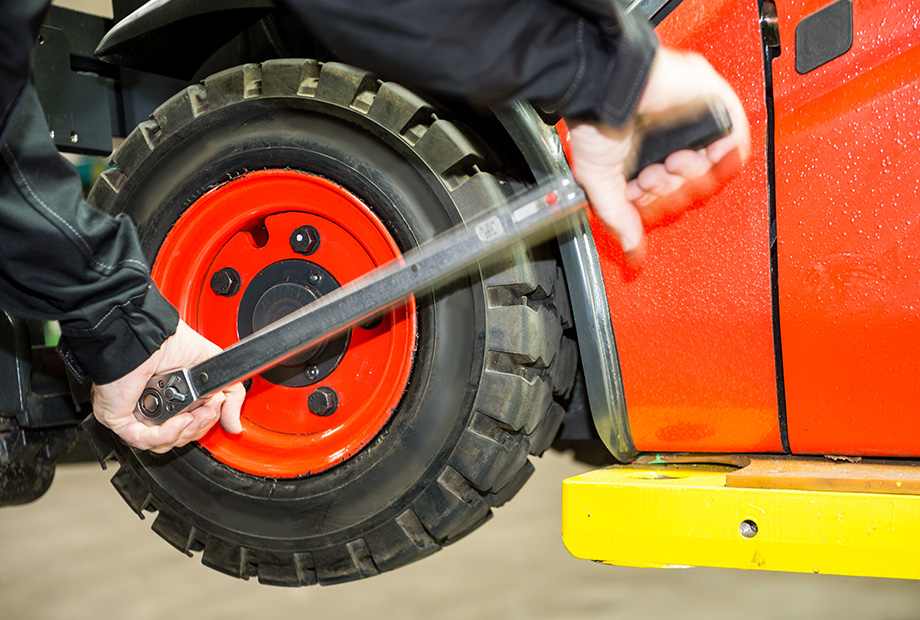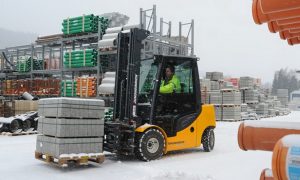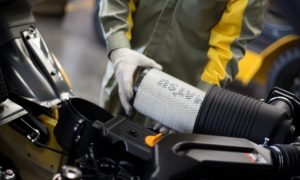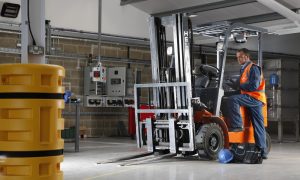The most common types of forklift truck tires are solid or pneumatic, but they aren’t the only varieties. Forklifts can be fitted with a range of specialized tires to optimize your fleet’s efficiency. Each type of tire offers a significant variety in the tread, compound, and ply rating. When you’re kitting out your forklift fleet, you should consider each variation of a tire and whether it will work best for your operation.
Why Do You Need Specific Forklift Tyres?
Not all tires can meet all needs. In order to maximize your fleet productivity, you need to ensure that your forklifts are able to operate at 100% regardless of changes in the environment. This is particularly true of outdoor operations where weather hazards are largely outside your control.
Some warehouses will require specific types of tires based on the location or nature of the materials being moved. Tire size should be decided after calculating the required load on each wheel. In general, pick a tire that carries the load with the lowest inflation pressure.
Types of Forklift Tyres
Cushion Tyres
Used only on smooth pavements and warehouses with concrete flooring where space is at a premium, cushion tires have a small turning radius.
Pneumatic
These are very popular tires. Similar to truck tires, pneumatic tires are air filled with thick, deep tread and made from strong wear-resistant rubber. They extend the running life of a forklift by providing a cushion effect between the forklift and the ground.
Off-Road
Often seen on side loaders at logging mills, off-road tires are best used for rugged, outdoor operations and areas where it’s often not practical to pave or tarmac your site. Their large, knobby tires provide excellent grip and high puncture resistance.
Polyurethane
Generally used for indoor forklifts. They have an adequate level of traction for indoors and possess a ‘small rolling resistance’ that extends their running life. This tire is generally found on indoor forklifts such as reach trucks and stacker trucks.
Puncture-Proof
Today’s most common forklift tire. While not air-filled, they cannot be punctured or go flat, which makes them long-lasting. Excellent for indoor use or light outdoor use, but not for rough outdoor or uneven surfaces due to the lack of cushioning.
Fiberglass
These tires have a much higher resistance to heat. This makes them very situational, but very handy in very hot environments. In such situations, fiberglass tires last far longer than standard tires.
Static-Resistant
These tires are specifically designed to prevent static discharge. These tires are best for use in facilities that handle materials that are highly combustible or explosive.
Non-Marking
Non-marking tires are specifically designed to prevent black marks on floors. Grocery and food processing factories are required to use them. The main drawbacks of non-marking tires are that the carbon black is removed from them, which consequently shortens the life span of the tire.
Foam-Fill
These tires are filled with a special resin that provides a constant pressure in the tyre whilst preventing punctures. They are designed to be like air tires by providing a cushioning effect, without the risk of getting punctures.
Winter Tyres
When working on ground that builds up ice, like cement and flat surfaces, non-slip winter tires provide greater traction when you need it.
Forklift Tyre Maintenance and Upkeep
Make sure the air pressure in your tires is checked regularly to ensure that it’s always at the correct level. There are many factors that can increase or decrease tire pressure.
For example, heat builds up from extended use can cause tire pressure to increase. Make sure all caps and valves are covered and don’t lower air pressure by bleeding, as it can increase the build-up of heat.
Refrain from sudden braking or starting movements, cornering at excessive speed, or locking a wheel for tight turns. These high impact manoeuvres can wear out your tires quickly.
Tires should be stored in a cool, dark and oil-free area. Avoid keeping them close to any active electric engines. Try to not store tyres for long periods of time, as rubber has the ability to decay over time.
Also, keeping your forklift tires in good shape will help reduce wear and tear, along with any stress on the transmission and the forklift driver. Proper tyre maintenance will significantly improve fuel efficiency – and help to improve overall safety.

Benefits of Good Forklift Tyres
Maintaining good forklift tires should be part of your regular fleet maintenance. This will help keep your forklifts operating at high efficiency as safely as possible. Downtime on forklifts costs money, but preventative tire maintenance will help keep the wheels spinning and the costs down. Good grip and tire pressure mean your fleet will be operating as safe as possible. Compromised tires can affect the handling of your forklift trucks, turning them into a mobile hazard. Avoid the danger posed to people and property by maintaining good forklift tire upkeep.
Just as tires are suited to different environments, so are forklifts. Check out our extensive range of forklift trucks right here.



